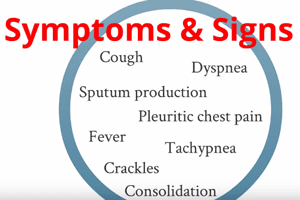
CDC Suggests That Community Acquired Pneumonia May Be More Common. Preliminary research from the Centers for Disease Control and Prevention (CDC) suggests that community acquired pneumonia (CAP), which is caused by the Staphylococcus aureus bacterium may be more common than originally suspected, including that caused by antibiotic resistant strains. “Over the last few years we have […]

CDC Suggests That Community Acquired Pneumonia May Be More Common. Preliminary research from the Centers for Disease Control and Prevention (CDC) suggests that community acquired pneumonia (CAP), which is caused by the Staphylococcus aureus bacterium may be more common than originally suspected, including that caused by antibiotic resistant strains. “Over the last few years we have been receiving reports of a severe CAP caused by S. aureus. There are a lot of questions about this disease, but until now there have primarily been case studies which tend to highlight the severest of cases and may present a biased picture,” says Alexander Kallen, a lead researcher on the study. Researchers are particularly concerned with CAP that is caused by methicillin-resistant Staphlycoccus aureus – also known as MRSA.
Kallen and his colleagues focused on three pediatric hospitals in the Atlanta area during the 2006-2007 influenza season and conducted surveillance for S. aureus CAP. They identified 53 cases, a higher number than expected. “No one really knows what the true incidence of S. aureus CAP is. People suspect that S. aureus causes three-to-five percent of all CAP cases, but the number of cases per month we found suggest that these rates of S. aureus CAP might be higher than previously estimated,” says Kallen. The data also suggests that the case-fatality rate may be slightly lower than the rate reported in recent cases, which were between 30% and 50%. Kallen’s study reports a case-fatality rate of about 13%, which is much lower than previous estimates.
Researchers also studied antibiotic resistance. “One thing that concerns us is methicillin-resistant S. aureus (MRSA) increasing in the community,” says Kallen. As with mortality, they found that while the proportion of S. aureus CAP cases caused by MRSA was lower than the case series, it was still significant. Approximately half the S. aureus CAP cases were caused by MRSA, compared to 70%-80% suggested by recent case series. “Our study found about half the patients had MRSA, which is not unexpected, but quite concerning,” says Kallen.
Even more concerning to Kallen was the fact that close to 40% of the children with MRSA CAP were not dosed with antibiotics for the resistant strain. “The fact that a lot of these kids who had MRSA were not treated with antibiotics that have activity against MRSA suggests that clinicians are not recognizing this organism as a cause of CAP during influenza season,” says Kallen. Kallen said this study is just the first step toward a better understanding of the patterns of this disease and that much more study is needed.
The mutated form of staph—MRSA—when not treated early, is resistant to all but the one antibiotic of last resort. Formerly used in the most potent cases, this drug is being used more and more and, as a result, MRSA is developing resistance to this last successful medication. Last year alone, 94,000 Americans developed MRSA with most of them infected in healthcare facilities. Previously limited to hospital and nursing home patients, MRSA is now striking and killing in communities. CDC estimates place last year’s MRSA death toll at 19,000 Americans, with 2,000 of these people—healthy people—contracting community-based MRSA.
The personal injury attorneys at Parker Waichman LLP offer free, no-obligation case evaluations. For more information, fill out our online contact form or call 1-800-YOURLAWYER (1-800-968-7529).


